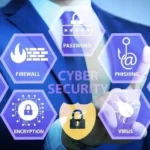Is your home security good enough? With smart homes becoming the new trend, you might have to pay attention to cybersecurity more than the physical one. Having alarms and locks installed means nothing if the main devices can be hacked.
Imagine coming home from work to an empty apartment. The first thing that comes to your mind would be to call the police and check the doorbell camera. However, no one enters or leaves when you play the recording or the timeslot when the break-in has been deleted.
What happened?
A hacker has physically robbed you. That’s not something that a lot of people are used to hearing. Usually, criminals stick to one trade. They either rob people physically, or they hack them from a distance. Well, a new breed of cybercriminals is entering the mix.
The easiest smart home devices to hack are baby monitors, garage door openers, smart security systems like locks, doorbell cameras, and TVs. All of these have critical or highly severe vulnerabilities. Firstly, they’re connected to your home Wi-Fi router. If you have a weak password or someone knows your IP, they can be exploited easily. Secondly, they’re connected to the internet of things network, making them even less secure.
Here’s what happened. At least one of your devices wasn’t secure enough to fend off hackers. That mainly happens from not using a VPN. You leaked your IP address online, or your password was weak and relatively easy to crack.
When the hacker takes control of one of your devices. When no matter the case they invade, they soon have access to everything else. After watching you for a week, the hacker decided to start the crime.
They came to your apartment, knowing that you were at work and no one was home. They turned off the doorbell camera and opened the smart lock mechanism through your Wi-Fi. When they left, they locked it again and enabled the camera.
How to avoid the same scenario from ever happening again?
Even though there are loads of security issues with smart homes, that doesn’t mean you can’t avoid them. If that were the case, then no one would produce them in the first place. There are a few ways to enjoy the luxury of a smart home without worrying about getting hacked or robbed.
Protect your router
The first line of defense is your router. If a hacker gains access to the router, they can see the IP address of every device that’s connected to it. You don’t want that to happen. The only way to protect your IP information from leaking is to use a VPN. There are multiple layers of protection that bounce the info through several servers by using high-tech encryption.
On top of that, you should also change the default password. Using a long-phrase with uppercase and lowercase letters, numbers, and special characters is best. Remember, the longer the password, the harder it is to break it.
Buy original devices
Why buy a branded smart lock when you can order one from China for less than ten bucks? This kind of thinking could get you in a lot of trouble. There’s usually a catch when something is selling for a low price.
Certain manufacturers quickly put out products on the market without passing security standards. There are thousands of untested smart tech devices that are easy to hack. Plus, gadgets masked like toys can open garage doors with a single click. Always read reviews and check whether the company has made similar devices in the past.
A few final words
The European Commission president Ursula von der Leyen said that cybercriminals could hack everything connected to the internet. That’s true about every sector, including government, healthcare, and banking. The two largest hacking organizations are battling it out because of the current conflict between Russia and Ukraine. You don’t want to be caught in the crossfire.
Make sure to take some steps to increase the security of your home before you broadcast your data to the world. Read the documentation, use a VPN, change passwords regularly, and don’t buy cheap copies. That way, you can avoid coming home from work to an empty apartment or house.








